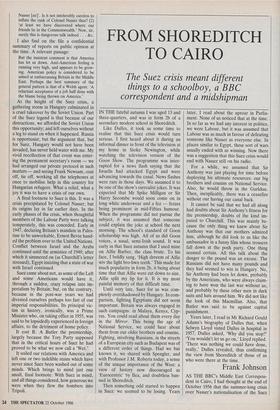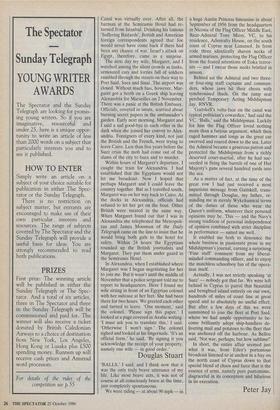AS THE BBC's Middle East Correspon- dent in Cairo, I
had thought at the end of October 1956 that the summer-long crisis over Nasser's nationalisation of the Suez Canal was virtually over. After all, the barman at the Semiramis Hotel had re- turned from Istanbul. Drinking his famous 'Suffering Bastards', British and American foreign correspondents agreed that Joe would never have come back if there had been any chance of war. Israel's attack on Egypt, therefore, came as a surprise.
The next day my wife, Margaret, and I watched among the silent crowds as tanks, armoured cars and lorries full of soldiers rumbled through the streets on their way to Port Said, Suez and Sinai. The airport was closed. Without much fuss, however, Mar- garet got a berth on a Greek ship leaving Alexandria for Marseilles on 2 November. There was a panic at the British Embassy. Officials, covered in smuts, scurried about burning secret papers in the ambassador's garden. Early next morning, Margaret and I said a sad good-bye to each other in the dark when she joined her convoy to Alex- andria. Foreigners of every kind, not just the British and the French, were trying to leave Cairo. Less than five years before the Suez crisis the mob had come out of the slums of the city to burn and to murder.
Within hours of Margaret's departure, I caught the train for Alexandria. I had established that the Egyptians would not let me broadcast. Now I hoped that perhaps Margaret and I could leave the country together. But as I travelled south, Margaret was on her way back to Cairo. At the docks in Alexandria, officials had refused to let her get on the boat. Other British were treated in the same way. When Margaret found out that I was in Alexandria she telephoned the Metropoli- tan and James Mossman of the Daily Telegraph came on the line to insist that he would bring both girls to the hotel for safety. Within 24 hours the Egyptians rounded up the British journalists and Margaret. They put them under guard in the Semiramis Hotel.
In Alexandria, when I established where Margaret was I began negotiating for her to join me. But it wasn't until the middle of November that a police sergeant told me to report to headquarters. Here I found my wife sitting in front of an Egyptian colonel with her suitcase at her feet. She had been there for two hours. We greeted each other and turned to leave. 'One moment,' said the colonel. 'Please sign this paper.' I looked at a page covered in Arabic writing. 'I must ask you to translate this,' I said. 'Otherwise I won't sign.' The colonel sighed and looked at his fingernails. 'It's an official form,' he said. 'By signing it you acknowledge the receipt of your property, namely one wife — in good order.'
Douglas Stuart



























































 Previous page
Previous page